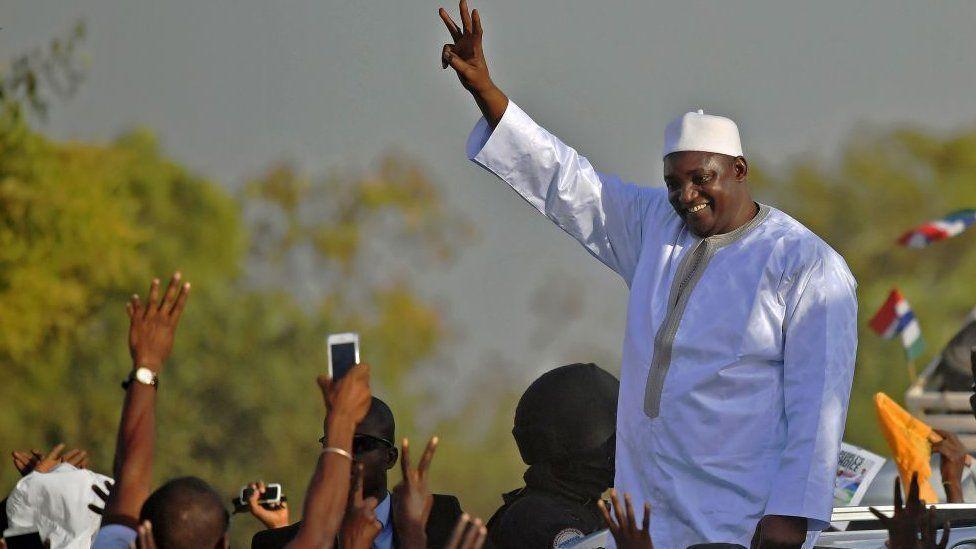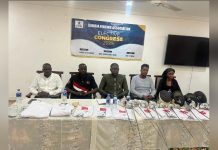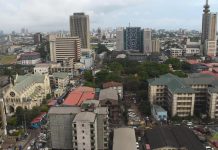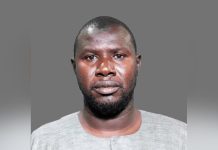By Muhammed Jallow
Africa-Press – Gambia. As President Adama Barrow prepares to embark on his Meet The People Tour, a democratic exercise funded by the taxpayers of The Gambia, the voices of concern emanating from citizens particularly those in rural communities demand both attention and introspection. These are not voices of rebellion but of patriotic expectation. They echo the frustrations and aspirations of a people who desire that their nation’s progress be not just spoken of, but felt in their homes, schools, farms, and daily lives.
The taxpayers’ concerns, articulated with clarity and conviction, encapsulate the very essence of good governance: accountability, transparency, and responsiveness. They have raised critical issues the lack of access to clean drinking water, the struggles of farmers, the dilapidation of schools, the shortage of teachers, the dire state of some roads, the security threats from cross-border incursions, and the destruction of essential public infrastructure like the Farafenni Magistrates Court. These are genuine grievances that deserve not defensiveness but reflection, and most importantly, action.
The duty of accountability
The taxpayers’ reminder that the Meet The People Tour is financed by public funds serves as a crucial moral compass for leadership. It underscores that governance is not a privilege bestowed upon a few, but a responsibility owed to all. President Barrow’s decision to meet citizens face-to-face is, in itself, an affirmation of democratic accountability. However, such an engagement must transcend symbolism. It must yield results, illuminate truths, and restore confidence in public administration.
In this context, the Barrow Government’s performance cannot be dismissed as mere rhetoric. While challenges persist, it is intellectually dishonest to deny the tangible progress that has unfolded across the nation. The government’s achievements, though imperfect, stand as verifiable evidence of intent and direction.
The water question: A lifeline for rural dignity
Water remains one of humanity’s most fundamental needs, yet for decades, many Gambian communities have been deprived of this basic right. The current administration has recognised this inequity and undertaken significant steps to rectify it. Through the Ministry of Fisheries and Water Resources, and in partnership with NAWEC and international development institutions such as UNICEF and the Islamic Development Bank, the government has expanded rural water supply projects and introduced solar powered boreholes across multiple regions.
These are not abstract promises. Communities that once relied on unsafe wells now have sustainable access to clean water. While gaps remain, it is important to acknowledge that the foundations of a modern, equitable water distribution system are being laid. A government cannot solve generational problems overnight but it can, and indeed must, be judged by its sincerity and momentum toward resolving them.
Agriculture: The soul of the nation
The lament of the Gambian farmer especially the groundnut cultivator has been a recurring national chorus. Delayed payments, market access challenges, and poor pricing mechanisms have long stifled rural livelihoods. Yet under the Barrow administration, structural reforms have begun to take root. The revitalisation of the Gambia Groundnut Corporation (GGC), the establishment of the ROOTS Project with World Bank support, and the introduction of mechanised farming and fertilizer subsidies all signify a deliberate attempt to reposition agriculture as a productive and profitable sector.
The ambition is not only to feed the nation but to elevate farming from subsistence to sustainability. The government’s agricultural agenda seeks to empower farmers with technology, financial inclusion, and access to regional markets. While progress remains uneven, the strategic intent is visible and deserves objective recognition.
Education: building minds, building nations
Education stands as the bedrock of national transformation. The government’s Education Sector Strategic Plan (2023–2028) reflects a renewed commitment to addressing the challenges that plague the sector. In recent years, hundreds of classrooms have been constructed or rehabilitated, school feeding programs expanded, and solar installations introduced to support rural learning environments.
The shortage of qualified teachers, particularly in the sciences, remains a genuine concern. Yet, through incentive packages, rural teacher allowances, and continuous professional development initiatives at Gambia College, the government is gradually narrowing the deficit.
True development begins in the classroom. And while the road ahead is long, it is undeniable that education under the Barrow Government has moved from neglect to prioritisation a shift that must be sustained through both funding and fidelity.
Infrastructure: The arteries of progress
No government in recent Gambian history has undertaken road construction and infrastructural development on the scale witnessed in the last seven years. The Hakalang Road, the Bertil Harding Highway Expansion, and the Soma Basse Highway stand as monumental achievements linking communities, markets, and opportunities.
It is easy to critique that some villages remain disconnected, but development is a process, not a miracle. The Feeder Roads Rehabilitation Project, financed by the African Development Bank, is systematically extending access to remote communities ensuring that no region remains isolated. These investments not only stimulate commerce but also enhance healthcare access, education, and national integration.
The taxpayers’ grievances about unpaved roads and poor rural connectivity are justified; yet, it is equally factual to acknowledge that progress is visible, measurable, and ongoing.
Health and human security
The stories of women giving birth on donkey carts or citizens struggling to reach distant health centres are deeply distressing. They highlight the stark inequalities that still define healthcare delivery in rural Gambia. To confront this, the government has accelerated the construction and upgrading of health posts, maternity wards, and ambulance services.
The Emergency Medical Services (EMS) system, coupled with the National Health Insurance Scheme, has marked a paradigm shift in healthcare accessibility. Furthermore, the Ministry of Health continues to strengthen partnerships with development agencies to ensure that essential drugs, vaccines, and personnel reach every corner of the country.
On the security front, concerns about cross-border crimes are legitimate. However, the Barrow Government has adopted a proactive approach through reinforced cooperation with Senegal under the Senegambia Security Cooperation Framework. The modernisation of the Gambia Police Force with new vehicles, surveillance systems, and community policing units demonstrates a shift from reactive policing to preventive security.
Justice and Institutional Renewal
The destruction of the Farafenni Magistrates Court is a painful symbol of infrastructural fragility. Yet, the government’s immediate response pledging the construction of a new, modernised judicial complex reflects a strong commitment to justice delivery.
This initiative is part of a broader institutional reform agenda to digitize the judiciary, improve case management, and ensure that justice is accessible, swift, and fair. The Barrow administration understands that without a functioning justice system, democracy loses its soul and citizens lose faith in the rule of law.
Confronting corruption: The unfinished battle
Corruption remains the cancer that eats away at public trust and development. President Barrow’s government has made commendable strides in establishing the Anti-Corruption Commission and strengthening fiscal discipline through the Ministry of Finance’s Public Financial Management Reform Program.
But the fight against corruption must be relentless. It requires not only institutions but also moral courage from every public servant, minister, and technocrat. Transparency should not be seasonal; it should be a permanent culture of governance. Citizens have every right to demand how their taxes are utilised, and the government has an equal duty to provide honest answers.
A government’s obligation and a citizen’s role
The responsibility of governance is not confined to the President alone. Every technocrat, every Permanent Secretary, and every Minister must become a communicator of progress and an advocate of accountability. They must engage communities directly, explain government policies clearly, and confront misinformation with evidence.
It is not enough to announce projects from podiums; the people must feel them in their daily lives. The taxpayers deserve to see their contributions translated into public value clean water, functioning schools, secure communities, and responsive institutions.
The essence of the Meet The People Tour
The Meet The People Tour is not a campaign expedition; it is a social contract in motion. It symbolises leadership in its truest form listening, learning, and acting. If effectively utilised, it will bridge the gap between government and governed, strengthen mutual trust, and ignite a new spirit of civic partnership.
President Barrow must use this platform not for political theatre but for honest dialogue. Let the tour become a mirror reflecting both achievements and shortcomings a space where citizens speak without fear and leaders respond without pretence.
Conclusion: The measure of progress
The Gambia stands today at a defining moment. The citizens have spoken with sincerity, and the government must respond with integrity. The criticisms are not attacks; they are opportunities for recalibration.
In truth, the Barrow Government has made measurable progress across sectors roads, health, water, education, and agriculture but it must also redouble its efforts to ensure that no Gambian feels left behind. The taxpayers are not adversaries; they are partners in nation-building. Their concerns are not threats; they are reminders that democracy thrives only when leadership listens.
As President Barrow embarks on this national journey, he carries not just the weight of office but the collective hope of a nation yearning for transformation. The task ahead demands humility, courage, and unwavering commitment. Governance is not about celebration it is about service.
The Gambia’s future will not be built on speeches or slogans but on sincerity, equity, and the relentless pursuit of the common good. For in the end, history will not judge leaders by what they promised, but by what they delivered.
Source: The Standard Newspaper | Gambia
For More News And Analysis About Gambia Follow Africa-Press






